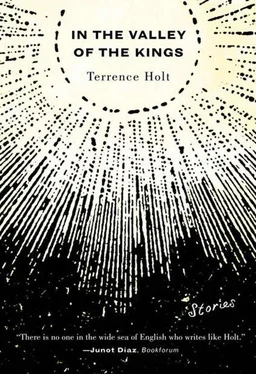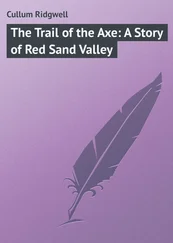I heard a chair move, and felt a hand on my shoulder. — I’ll go warm up the truck.
The man did not return. I heard an engine catch, roar, and settle into a rapid idle. A woman, in a faded print, and herself worn thin enough to show the pulse at her temple, a tremor in her jaw, each bone and tendon of her hand, sat around the corner of the table. She reached out to touch the tabletop before me, paused.
— Your wife alone? Her voice was hoarse.
I wondered what she might mean, and looked around the room. Through an open door I saw three children all alike in dingy pastel pajamas, staring back at me.
— We let them stay up late tonight, she apologized. — When we talk about it, they don’t understand. But they like to stay up. We wanted to do something for them. She looked at them, and whispered, — Do you know what I mean?
I stood abruptly, caught myself with a hand on her shoulder and staggered into her lap. Embarrassed, she gave me her thin arm, and, biting her lower lip, led me to the truck. There she whispered to her husband, and, with a shy glance at me, kissed him long and urgently. Then we were gone.
The road was drifted deep where snow had blown across the fields. The clouds had broken before the rising wind. The moon burned bright at our backs, the only thing in the ghostly sky. It shone unnaturally bright. I felt it pushing, as it brightened by the minute, behind us.
The man drove fast, his need for haste twice mine. Deer were everywhere. They stood in silent groups of twos and threes beside the road. Smaller shapes, writhing in the headlights, fled before us. Overhead, darkness dotted the sky, flitting from horizon to horizon as if the graves gave up their dead. The face of the man beside me was taut in the dim green light of the speedometer. He swerved to miss something that froze before us — a skunk — and silently drove on.
He turned on the radio, tuned from static to a voice beseeching to the sound of running water, then fire, then large masses breaking, waves upon a shore, marching feet, applause, a voice explaining, violins, a chorus shouting, a man singing
Froh, wie seine Sonnen fliegen
Durch des Himmels prächt’gen Plan.
He switched it off. — Last night there was hymns, down from Canada. You could tell it was hymns, even in French.
One road to the city was blocked by fire: black against the flames, men and women were dancing, singing, in tuxedos and gowns, diamonds flaming like stars.
The bridge from the north was destroyed.
The way from the south was blocked by a creature I cannot describe.
The door was unlocked. It opened into the dark hall, and I stepped in. I stood in the doorway, seeing no reason to shut the door behind me. The house was as cold as a crypt, and — I knew without having to ask — as empty. I wondered where she would be when the time caught her. I hoped the time would find her ready. I would never be, and saw no reason to wait, not any longer.
I went to the kitchen and pulled the stool up to the sink, and fumbling open the casing of the clock I found the vial I had hidden the night we fought. Not all of the drugstores had been closed that evening. I am more coward than I seem. I stood on the stool, the vial warming in my palm, and tried to remember something I had forgotten. The silence in the room was complete.
The clock at my ear was silent.
She reached up and took the vial away. — I poured it out. It’s just food coloring now.
How foolish I was to think anything would remain hidden! She helped me from the stool, stopping me as I started to fall. Her hair was cold, smelling of the outdoors. For a long time we were silent. For the space of half an hour, nothing mattered.
Then she moved, reached up a hand to touch my face. The light of the moon had brightened abruptly, as if a window shade had snapped up. As the light and silence grew, I felt the spell that has kept me speechless breaking. But when I bent to her ear and started to whisper, she placed her hand gently over my mouth and held it. I understood: there is nothing to say.
We stood together in the growing light, the thunder rumbling in the distance, drawing nearer, and I shrugged away impulses that no longer had meaning — to speech, to fear, to sorrow. I felt laughter growing inside me. Certainly she was laughing. At the window, moonlight poured in.
Ellen spoke. — Is there anything you want?
— Yes. The words came easily. — I want to finish something.
And at the door of this room, she left me. — I’ll call if I need you.
LITTLE REMAINS. She is calling. The moon burns still brighter with each passing second, leaves my hand too slow to record, to report. I must end now.
But before the end we will speak once more, of everything that matters: of the brightness of the moon; of the birds still flying dark against the sky; of the man who brought me here; of the hours that she waited; of what we would name the child; of the grace of everything that dies; of the love that moves the sun and other stars.
Terrence Holt began writing the stories in this collection while he was earning MFA and PhD degrees in English from Cornell University. His first published story, “Charybdis,” appeared originally in the Kenyon Review and was included in the O. Henry Prize Stories 1980. After a decade teaching English literature and creative writing, Holt enrolled in night school premedical courses at the University of Pennsylvania and went on to earn his MD from the University of North Carolina at Chapel Hill, where he now holds academic and clinical appointments in the Department of Social Medicine and the Division of Geriatric Medicine. “I went into medicine for reasons having nothing to do with writing,” he says. “It was only after I’d been at it for several years that I realized I’d found another way of doing the same thing.”
“In both,” Holt explains, “I’m intimately involved with the limits of human existence — of life, of compassion, of our capacity to understand ourselves in our world. For me, these stories are more than anything else about where stories come from, and where they take us. They’re about the moment-by-moment process by which our brains convince us that the world exists, and the gaps in that process as well. Those flaws in the illusion are what I want to capture. They’re the chinks in the structure where mystery gets in and haunts our lives — and through which one day we slip into eternity.”
In addition to his writing and the practice of medicine, Holt is an avid amateur astronomer and has written a handbook for amateurs, The Universe Next Door . He lives in Chapel Hill with his wife and two sons, with whom he haunts the flea markets and bass ponds of the Piedmont, respectively. He also plays the Highland bagpipes — very badly, he says, but very, very loudly.










